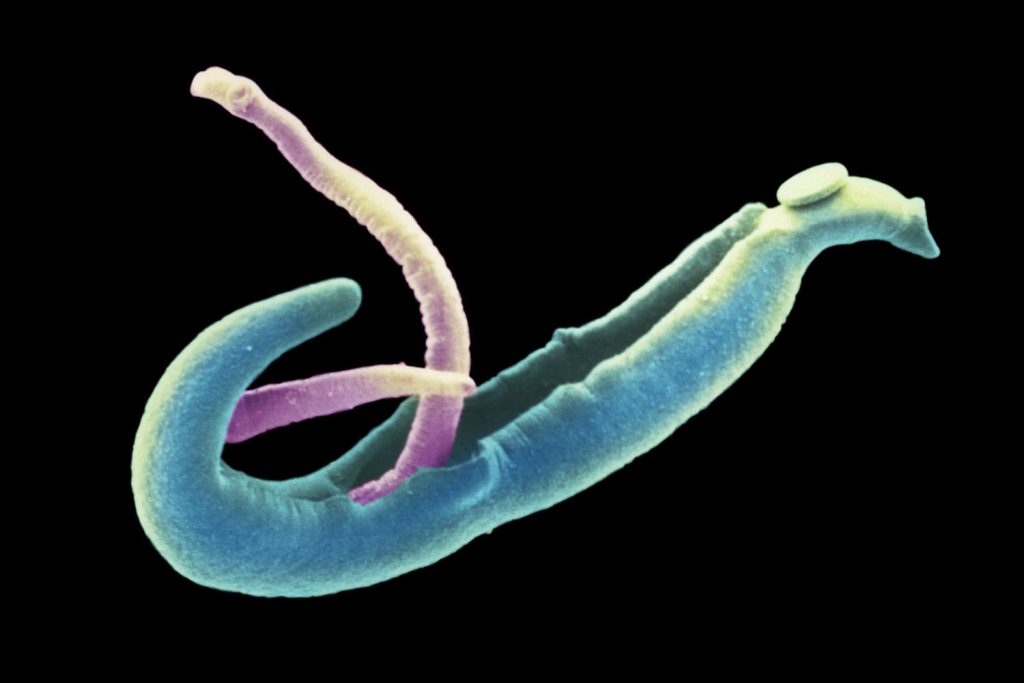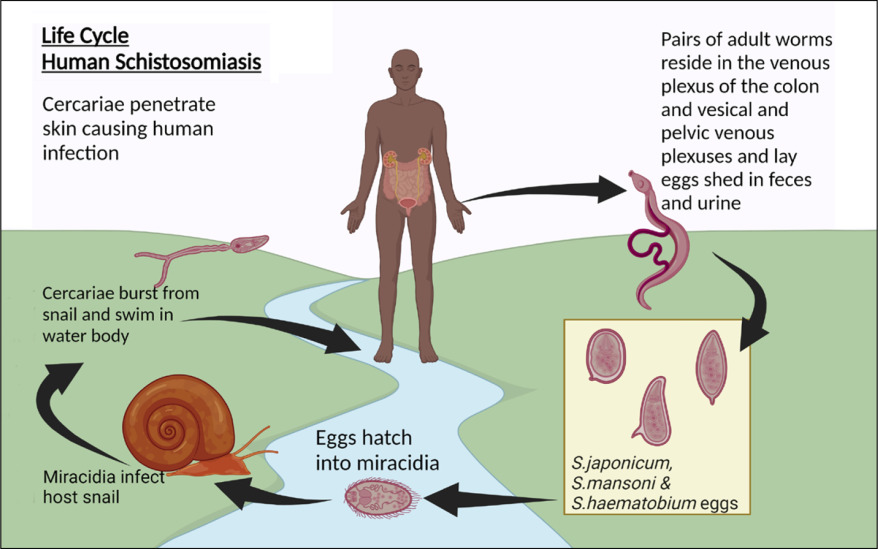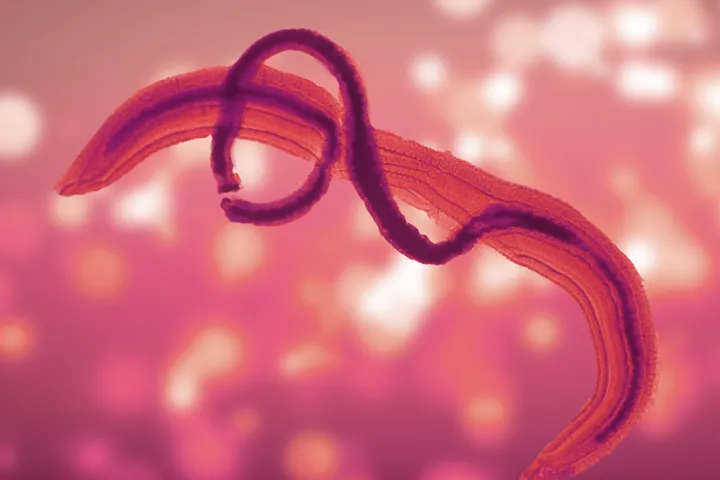Schistosomiasis, also known as bilharzia, is a parasitic disease caused by flatworms of the genus Schistosoma. It occurs when people come into contact with freshwater sources contaminated with the larval form of the parasite, which is released by infected freshwater snails. The larvae penetrate the skin, enter the bloodstream, and travel to organs such as the liver, intestines, or bladder, where they mature and produce eggs. Some of these eggs are passed out of the body in urine or feces, while others become trapped in body tissues, causing inflammation and damage. Schistosomiasis is common in tropical and subtropical regions, particularly in parts of sub-Saharan Africa, South America, the Middle East, and Southeast Asia. In its early stages, the disease may cause symptoms like itchy skin, rash, fever, chills, and muscle aches. If left untreated, it can lead to chronic complications such as abdominal pain, diarrhea, blood in the urine or stool, liver enlargement, and long-term organ damage. Fortunately, schistosomiasis can be effectively treated with the antiparasitic drug praziquantel. Prevention focuses on avoiding contact with contaminated water, improving sanitation and access to clean water, controlling snail populations, and conducting regular mass treatment programs in high-risk communities.

Where It’s Found:
- Common in tropical and subtropical regions, especially:
- Sub-Saharan Africa
- Parts of South America
- The Middle East
- Southeast Asia
The symptoms of schistosomiasis :
depending on the stage of infection and the part of the body affected. In the early stages, shortly after the parasite enters the skin, individuals may experience an itchy rash or skin irritation, often referred to as “swimmer’s itch.” As the infection progresses, symptoms such as fever, chills, cough, muscle aches, and general fatigue may occur as the parasites migrate through the body. In chronic cases, which can develop months or even years after initial exposure, more severe symptoms may appear. These include abdominal pain, diarrhea, and blood in the stool for intestinal schistosomiasis, or blood in the urine and painful urination in urinary schistosomiasis. Long-term infections can cause serious complications such as liver or spleen enlargement, kidney damage, bladder fibrosis, infertility, and in some cases, increased risk of bladder cancer. Without treatment, the ongoing inflammation and immune response to trapped parasite eggs can lead to lasting organ damage.
Early stage (within days or weeks):
- Itchy skin or rash (“swimmer’s itch”)
- Fever
- Chills
- Muscle aches
- Cough
Chronic stage (months or years later):
- Abdominal pain
- Diarrhea or blood in stool (intestinal schistosomiasis)
- Blood in urine (urinary schistosomiasis)
- Enlarged liver or spleen
- Kidney or bladder damage
- In severe cases, it can cause infertility, liver fibrosis, or bladder cancer

Solutions for Schistosomiasis:
ChatGPT a dit :
The primary solution for schistosomiasis is timely medical treatment, combined with preventive measures to stop reinfection and reduce the spread of the disease. The most effective treatment is the antiparasitic drug praziquantel, which is taken orally and works by killing the adult worms living in the body. It is safe, affordable, and widely used in mass drug administration programs in affected areas. Early treatment can prevent long-term damage and complications. In cases with advanced organ involvement, additional supportive care may be needed, such as managing liver or kidney damage.
Prevention is also essential and includes avoiding contact with contaminated freshwater, especially in areas where the disease is common. Providing communities with safe drinking water, improving sanitation, and educating the public about the risks are critical for long-term control. Snail control—reducing the population of freshwater snails that spread the parasite—is another important public health measure. In endemic regions, routine mass treatment programs are often conducted to reduce the overall burden of the disease. Combining treatment with prevention and education is the most effective approach to controlling and eventually eliminating schistosomiasis.
🔹 Medical Treatment:
- Praziquantel – the main and effective drug used to kill adult Schistosoma worms.
- Single or repeated doses depending on infection severity.
- Safe for both adults and children.
🔹 Preventive Measures:
- Avoid swimming, bathing, or washing in contaminated freshwater in endemic areas.
- Use safe, clean water for daily activities.
🔹 Improved Sanitation:
- Proper disposal of human waste to prevent contamination of water sources.
- Access to clean toilets and hygiene facilities.
🔹 Health Education:
- Educate communities on how schistosomiasis spreads and how to protect themselves.
🔹 Snail Control:
- Reduce or eliminate freshwater snails, the intermediate hosts, through environmental management or use of molluscicides.
🔹 Mass Drug Administration (MDA):
- Regular preventive treatment campaigns in high-risk communities.
- Often conducted through schools and local health programs.
